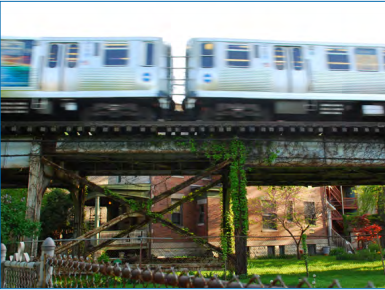
Joe Schwieterman, winner of the
American Society of Public Administration’s Louis Brownlow Award for Outstanding Public Administration Professor, is a professor in the School for Public Service, and he’s an expert in public policy,transportation and urban planning.
The ASPA says its Brownlow Award recognizes “Chicago-area college instructors who have made outstanding contributions to public service education, excellence in
teaching over a sustained period of time, and service to the wider community.”
Schwieterman has written numerous books, including “Terminal Town,” and peer-reviewed articles on the development of cities and transportation. He’s also director of DePaul University’s Chaddick Institute for Metropolitan Development, which promotes effective urban planning. Plus, he’s president of the Chicago Chapter of the Transportation Research Forum.
In an email memo that included news of the award, SPS Director Bob Stokes called Schwieterman “a true gem.”
“I am truly impressed at how much he works towards providing a very high quality student experience both inside and outside the classroom,” Stokes wrote.
Schwieterman shared his thoughts on teaching, students, SPS and public service.
What do you enjoy most about teaching at SPS?
That is an easy question: Students in SPS invariably have a strong sense of mission with respect to improving the communities in which they live. We see this in their personal statements written prior to gaining admission to our school, class discussions, and research papers. Our students want to effect change, whether in the public, private, or nonprofit sectors.
The shared values of our students create a spirit of cooperation in the classroom that is less pervasive in other programs. Of course, our students also strive for good grades, but they always “keep their eye on the prize,” which is working cooperatively with others to resolve public service problems. As a professor, I find that inspiring.
What makes urban planning and transportation particularly urgent topics?
To borrow a phrase from Charles Dickens, Chicago is a "tale of two cities" right now, with a downtown that is flourishing and many neighborhoods that are suffering greatly. The problems are especially acute on the Far South and West sides. Many neighborhoods are bereft of the aesthetic qualities and connectivity they need to make them attractive for redevelopment — and job creation. Some of my research shows why our city needs to better leverage its transportation assets — rails, roads and airports — as well as get a handle on infrastructure needs of low-income areas if it is to remain a premier Global City.
What got you interested in transportation?
I grew up near Lima, Ohio. As a kid, we would make occasional trips to Chicago, which cultivated my fascination with cities. Our tradition of coming to the city on the passenger trains of the Pennsylvania Railroad spurred my interest in transportation, which ultimately grew to encompass public transit, urban history and, finally, world geography.
In what ways can students feel as though they're "doing good" through work in public policy and urban planning?
A remarkable aspect of SPS students is the creative ways they find to help make cities more livable places, even while they are busy with our classes. They find internships, volunteer opportunities and leadership positions with advocacy groups, community development organizations, city departments, and consultancies. We are also extraordinarily proud to have alums who have advanced to senior leadership positions in such prominent organizations as the Chicago Metropolitan Agency for Planning, Chicago Community Trust, Metropolitan Planning Council, Pace Suburban Bus. SPS has a strong presence in the region that is growing stronger every year.
What would you say to a student considering the SPS program?
We allow you to develop skills and expand your network in myriad ways, not only through our extensive Loop Campus class offerings, but with study abroad experiences, internships, research opportunities, and professional events. We help you build a network among students and practitioners that is of tremendous value after graduation. Consider an example: I often ask students to describe the size of the “DePaul network” they have built through classroom interactions, and their responses always impress me. Most have networks of dozens of people. The networking process is spurred on by the fact our students are very technologically savvy, so they effortlessly create networks, often through LinkedIn, to stay in touch. Such connections are a springboard for jobs, lifetime friendships, and volunteer opportunities.